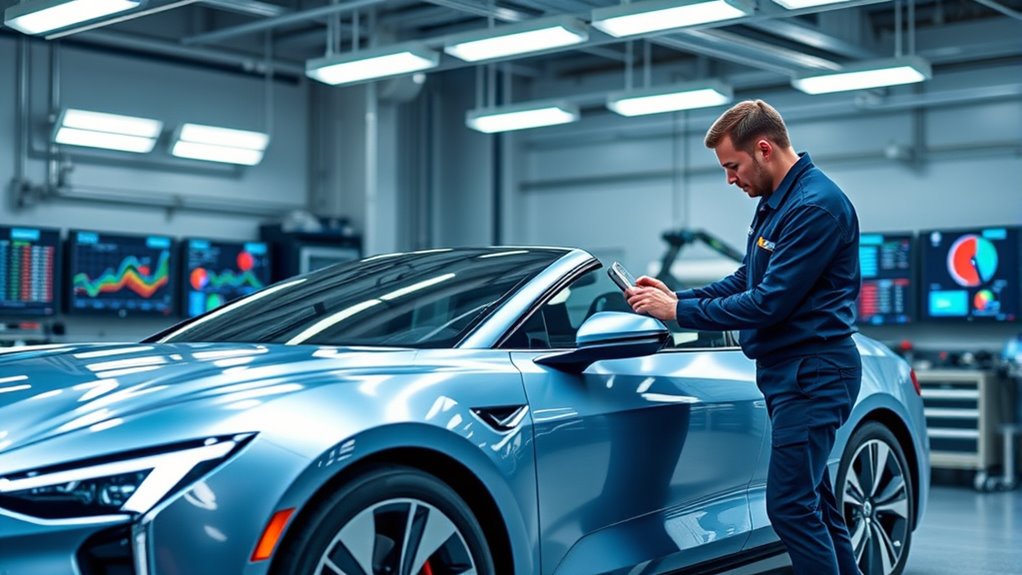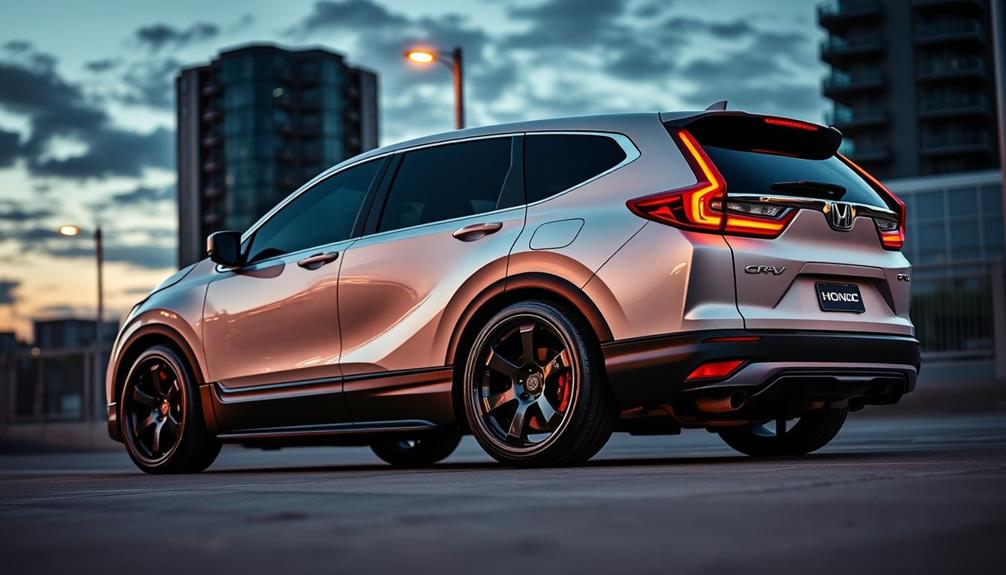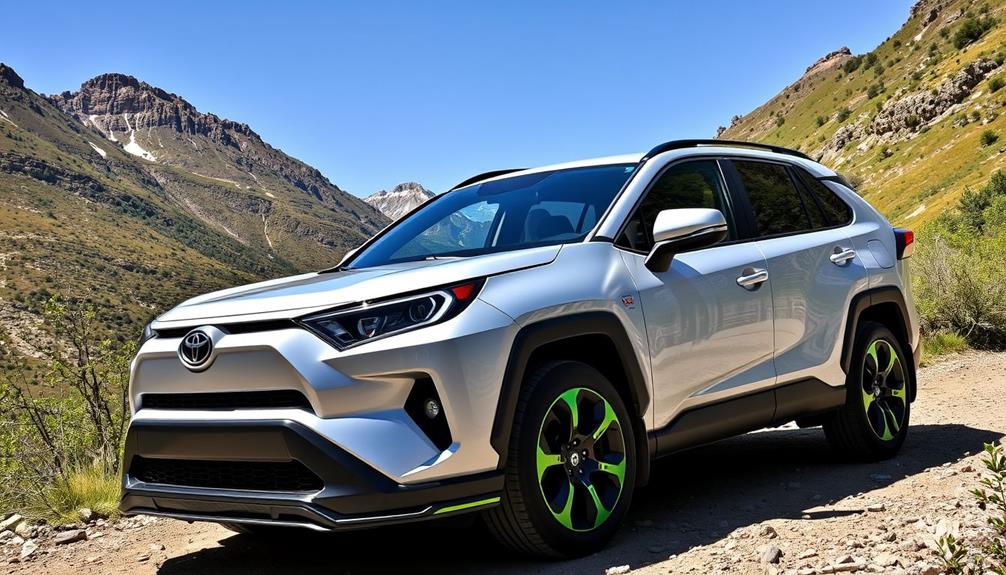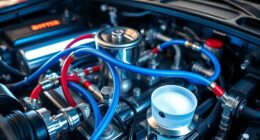AP Tuning now offers hybrid vehicle optimization services to help you improve fuel efficiency, reduce emissions, and enhance overall performance. They focus on fine-tuning components, optimizing control strategies, and selecting proper sizing for batteries and engines. By applying advanced modeling and optimization techniques, they guarantee your hybrid runs smoothly, efficiently, and reliably. If you want to discover how these enhancements can benefit your vehicle, there’s much more to explore below.
Key Takeaways
- AP Tuning now offers hybrid vehicle optimization to improve fuel efficiency and reduce emissions.
- They focus on fine-tuning energy management, component sizing, and control strategies for hybrids.
- Advanced modeling and algorithms are used to optimize hybrid performance and component selection.
- The expansion includes services aimed at enhancing hybrid reliability, environmental compliance, and cost-effectiveness.
- Their tailored solutions benefit both drivers and manufacturers by maximizing hybrid vehicle efficiency.

AP Tuning is expanding its services to include hybrid vehicle enhancement, helping drivers and manufacturers achieve better fuel efficiency and lower emissions. If you’re interested in making your hybrid vehicle perform at its best, understanding the core concepts of optimization can make a significant difference. This process involves fine-tuning various components and control strategies to ensure your vehicle uses energy sources efficiently.
Properly sizing elements like batteries and engines is crucial; it balances performance, cost, and energy consumption. For example, selecting the right battery weight directly impacts overall efficiency, while appropriate engine power ratings help optimize fuel use without sacrificing performance.
Proper sizing of batteries and engines optimizes performance, cost, and energy efficiency in hybrid vehicles.
At the heart of hybrid enhancement is developing effective control strategies. These strategies determine how power is split between electric motors and conventional engines during different driving conditions. By optimizing this balance, your hybrid can deliver better fuel economy and reduced emissions.
When you drive, your vehicle’s control system continuously adjusts based on factors like drive cycle and energy storage efficiency, ensuring you’re getting the most out of each energy source. This approach not only enhances immediate performance but also minimizes long-term costs by reducing wear and tear on components.
AP Tuning leverages advanced optimization methods, including mathematical modeling, to simulate how your hybrid performs across various scenarios. These models help predict outcomes and identify ideal configurations.
Techniques like linear programming and more complex algorithms such as MINLP are used to solve intricate problems in hybrid design, ensuring the best combination of component sizes, control strategies, and energy management. By employing powerful simulation tools like ADVISOR, we can analyze real-world driving patterns and optimize the hybrid system accordingly.
Comparing different algorithms allows us to select the most effective method tailored to your vehicle’s specific needs.
The ultimate goal is to improve key performance measures like fuel consumption, emissions, and cost. Refining power split strategies ensures your vehicle uses energy sources in the most efficient way, reducing environmental impact while saving you money over the vehicle’s lifespan.
Incorporating thermal and emissions modeling into the process guarantees that efficiency gains don’t come at the expense of higher emissions or excessive heat. Additionally, Vetted – AP Tuning practices ensure that all modifications meet safety and quality standards, providing peace of mind for vehicle owners.
This thorough approach ensures your hybrid vehicle operates smoothly, economically, and environmentally friendly.
As a result, whether you’re a driver seeking better mileage or a manufacturer aiming to meet stricter standards, hybrid vehicle enhancement can deliver tangible benefits, making your hybrid more efficient, reliable, and cost-effective.
Frequently Asked Questions
How Does Hybrid Tuning Differ From Traditional Vehicle Tuning?
Hybrid tuning differs from traditional vehicle tuning because it focuses on optimizing both the combustion engine and electric motor simultaneously. You’ll reprogram ECUs, balance energy regeneration, and customize drive modes, all while managing complex high-voltage safety protocols.
Unlike traditional tuning, which mainly adjusts mechanical parts, hybrid tuning involves software tweaks for power distribution, battery management, and seamless gas-electric switchovers to enhance performance and efficiency.
Will Hybrid Tuning Affect My Vehicle’s Warranty?
Your warranty is like a delicate dance on a tightrope—any misstep could lead to a fall. When you tune a hybrid vehicle, it’s a gamble; using non-approved systems can jeopardize your warranty, while manufacturer-approved modifications keep you steady.
To protect yourself, work with reputable tuners and stick to approved systems. Read the fine print carefully, so your performance upgrades don’t become your warranty’s undoing.
Is Hybrid Optimization Suitable for All Hybrid Vehicle Models?
Your question about whether hybrid optimization suits all hybrid vehicle models is important. Not all hybrids are the same; each has unique systems and design features.
While basic principles can apply broadly, effective optimization often requires tailoring strategies to your specific model. Factors like powertrain complexity and intended use influence suitability.
How Long Does the Hybrid Tuning Process Typically Take?
You’re wondering how long hybrid tuning usually takes. Typically, the process involves initial diagnostics, battery and system inspection, and ECU remapping, which can take anywhere from 2 to 6 hours depending on complexity.
Plug-and-play tuners are quicker, often completed within minutes to hours.
Factors like system complexity, software safeguards, and custom tuning needs influence the duration. After tuning, tests confirm performance gains and safety, ensuring your hybrid runs efficiently.
What Are the Cost Differences Between Hybrid and Traditional Tuning Services?
You’re likely to find that hybrid tuning costs more than traditional tuning because of the added complexity of optimizing both the engine and electric motor systems.
Hybrid tuning often requires specialized tools and expertise, which increases expenses.
Meanwhile, traditional tuning tends to be less expensive due to simpler modifications.
Keep in mind, though, that the higher costs for hybrids can be offset by long-term fuel savings and potential tax incentives.
Conclusion
With AP Tuning now offering hybrid vehicle optimization, you’re set to get the most out of your ride. This move shows they’re serious about staying ahead of the curve and delivering first-rate service. Whether you’re looking for better fuel efficiency or improved performance, they’ve got you covered. Don’t wait for problems to crop up—stay ahead of the game and trust that they’ll keep your hybrid running smoothly. After all, a stitch in time saves nine.










